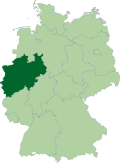 | |
| Founded | 1981 |
|---|---|
| Region | Westphalia North Rhine-Westphalia Germany |
| Qualifier for | German Cup |
| Current champions | Arminia Bielefeld (2024–25) |
| Most championships | Arminia Bielefeld (7 titles) |
The Westphalia Cup is a German football club Cup competition open to teams from the Westphalia region of the North Rhine-Westphalia state. The competition in its existing format is relatively new compared to many other regional cups in Germany. It is one of the 21 regional cup competitions in Germany. The competition also acts as a qualifier to the following seasons' DFB-Pokal. [1]